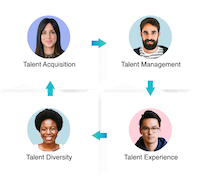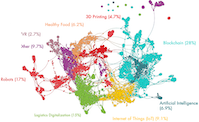Michael Palmer of the Association of National Advertisers expanded on Clive Humby’s statement. “Data is the new oil. It’s valuable, but if unrefined, it cannot really be used. (Oil) has to be changed into gas, plastic, chemicals, etc. to create a valuable entity that drives profitable activity; so must data be broken down, analyzed for it to have value.”*
We’ve come a long way in data as the basis for businesses, and we’re learning about its legal, social, and ethical boundaries along the way.
But there’s no doubt about the trend: Companies who use data as the sole base for their business are coming. And it’s growing into big business for many, not just social media platforms (exploiting user-generated data in return for free services), storage companies (operating the data centers where our clouds host our data), and companies providing software-as-a service (SaaS).
Data in recruiting and talent management:

Recruiting and managing employees is still mostly database-driven. Enter keywords, and databases, like LinkedIn, will list results. Consequently, resumes and LinkedIn profiles today are optimized for the very same keywords. Obviously, this does soon not produce the best results. If both recruiters and job seekers optimize for the same keywords (possibly using the same services), the best bot will be listed at the top, not necessarily the best candidate.
Recruiting and managing employees is still mostly database-driven. Enter keywords, and databases, like LinkedIn, will list results. Consequently, resumes and LinkedIn profiles today are optimized for keywords. However, this does not produce the best results. If both recruiters and job seekers optimize for the same keywords (possibly using the same services), the best bot will be listed at the top, not necessarily the best candidate.
Data can do more today. Eightfold uses AI to cross-reference and compare data from over 1 billion people. In this way hidden traits, or fits with particular company cultures or career paths across several companies and progressive educations become apparent. Eightfold built a business on the sole basis of data that is useful for recruiting and talent management. And investors agree that this has big potential. They financed the company with a Series D of $125m at unicorn valuation.
Data in reputation management:

Another area where vast amounts of ambiguous data are hard to interpret is reputation management or brand health. And with shitstorms on social media propagating at very high speeds, crisis management and recognizing trends are more complicated and time-critical than ever. Squid built a business providing a suite of “social analytics” to their clients solely based on analyzing data that others generate, such as social media, news tickers, and publications. The data is out there, much of it accessible publicly. All you need is a business idea of how to use data to create a new business. I’m very much looking forward to what creative uses of data will form the basis for the next unicorn companies!

